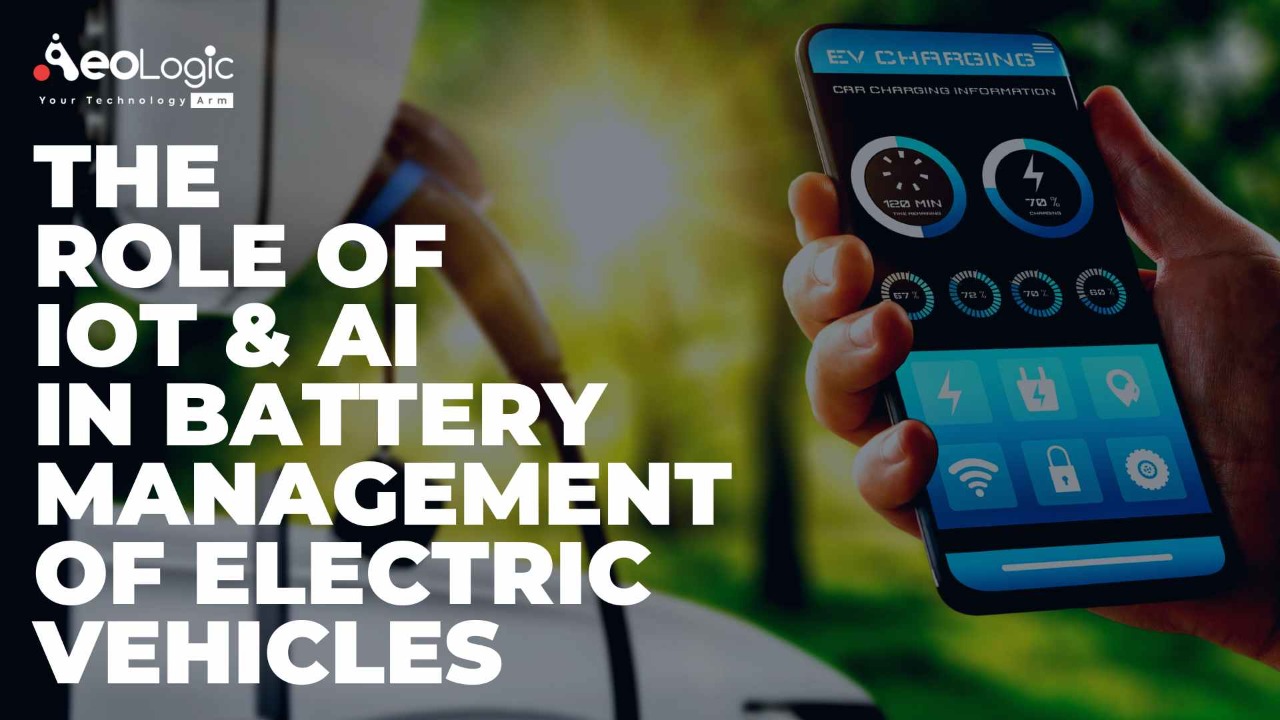Batteries are the lifeblood of an electric vehicle. They power the motor and provide the electricity that powers the vehicle. Without batteries, there would be no way to run an electric vehicle. If the batteries are not performing well, then the vehicle will not perform well either. In this blog, we talk about the role of IoT and AI in the battery management of electric vehicles. We also describe how IoT and AI can help you monitor your EV batteries and improve their performance.
So, without further ado, here we go!
Table of contents
- Introduction
- How IoT and AI Can Improve Battery Performance
- IoT and AI: Improving Battery Performance
- The Role of IoT and AI in Battery Management of Electric Vehicles
- IoT and AI: A Perfect Match For Battery Management
- IoT and AI: The Future of Battery Management
- Conclusion
Introduction
Electric vehicle adoption is growing rapidly, with a recent report estimating that by 2040, the number of electric vehicles on the road will surpass the number of conventional vehicles. To keep pace with this growth, it is critical that vehicle battery management systems (BMS) are able to monitor and control battery health and performance.
However, battery monitoring is difficult because of the number of variables that can impact battery performance. These include vehicle speed, driving conditions, temperature, and more.
Also Read: How Technology Is Changing the Future of Logistics
How IoT and AI Can Improve Battery Performance
The two most important factors in battery performance are charge density and cycle life. In recent years, researchers have been focusing on how to improve charge density by using new materials and optimizing current collectors. In addition, they are also trying to improve the cycle life by developing new electrode materials and optimizing battery design.
The Internet of Things (IoT) and Artificial Intelligence (AI) can help improve battery performance. A lot of these technologies are already being used in battery management systems.
The development of the Internet of Things (IoT) and Artificial Intelligence (AI) has the potential to improve battery performance by creating new ways to monitor and manage energy use.
Also Read: The Role & Benefits of ERP in Supply Chain Management
The Role of IoT and AI in Battery Management of Electric Vehicles
In today’s world, there are multiple factors that drive the development of new technologies. One such factor is the need to improve existing technologies. With this in mind, it is important to understand how IoT and AI can be used to improve battery management systems for electric vehicles (EVs).
Electric vehicles (EVs) are the future of transportation. They are clean, quiet and efficient. The technology behind electric vehicles is getting better every year. Electric cars are now able to travel up to 300 miles on a single charge.
One of the major issues with electric vehicles is their batteries. The batteries in electric cars have limited capacity, which makes it difficult for electric car owners to use their cars for long distances without having to refuel them frequently.
The solution to this problem lies in the use of IoT and AI technologies. These technologies can help provide an accurate picture of battery status and optimize charging times by using machine learning algorithms that can detect when a car is idle or parked. This will allow electric car owners to drive long distances without having to stop for recharging during those times when they aren’t using their vehicle.”
Also Read: Information Technology to Support the New Values of the EV
IoT and AI: A Perfect Match For Battery Management
The Internet of Things (IoT) and Artificial Intelligence (AI) are perfect for battery management.
The two technologies are often used together because they have different strengths. While IoT is primarily focused on gathering data from devices, AI is able to analyze this data to make predictions about future events based on past data. This makes it possible for both technologies to work together in order for them to achieve their full potential.
Also Read: The Role of AI in Education And Learning: Just Promises Or Revolution
IoT and AI: Improving Battery Performance
Battery management is an important component of electric vehicle (EV) technology. The battery is responsible for storing the energy required for an EV to operate, and it also serves as the primary source of power during acceleration and braking. However, modern batteries are not immune to degradation over time, which can result in reduced performance and potentially unsafe driving conditions.
One way to improve battery performance is by implementing artificial intelligence (AI) technologies like machine learning. Machine learning algorithms can be used to monitor the health of a battery over time by analyzing a variety of factors such as temperature and voltage levels. These algorithms can then recommend solutions that optimize performance or prevent damage from occurring entirely.
Also Read: 10 Ways to Use Artificial Intelligence to Improve Business Processes
IoT and AI: The Future of Battery Management
Battery management technologies will continue to evolve in order to meet the needs of both consumers and manufacturers alike. In order for these new innovations to succeed, however, they must first be accepted by consumers who value convenience above all else when it comes time for purchasing their next vehicle!
When it comes to the battery management of electric vehicles, IoT and AI are here to stay. The future of battery management is in IoT and AI, which will help improve battery performance by increasing efficiency and reducing costs.
The future of battery management is going to be a lot more exciting than we think.
With the rise of IoT and AI, we’re about to see a change in how batteries are managed in the home and business. This will have a huge impact on consumers, who will be able to make more informed decisions about their energy use and usage patterns, and businesses will be able to better manage their costs and reduce waste.
There are still some kinks to work out but this new technology is going to help us solve some of them.
Also Read: Why Is CRM Software a Game-changer When It Comes to Delivering Better Customer Experiences?
Conclusion
In conclusion, I think that IoT and AI are going to have a major impact on battery management in the future. The combination of these technologies will allow us to manage batteries more effectively and efficiently than ever before, which means that we can lower the costs of battery management by making it more accessible to a wider range of users. Additionally, the availability of cloud-based services means that anyone can be part of the process even if they don’t have a technical background!
If you want to keep and improve your business’s competitive edge, contact the Aeologic team to get started on your business journey.
FAQ’s
What is the role of IoT in battery management?
IoT enables EV owners to:
- Monitor battery performance in real-time
- Identify when the battery needs
- Find charging stations and parking spots that are convenient
- Determine if the battery has enough charge to complete a trip.
What are the benefits of using IoT for EV battery management?
IoT enables EV owners to monitor their battery’s performance in real-time and takes corrective action to avoid any potential battery issues.
Related Blogs:
- How AI/ML Can Change the Public Transportation Industry
- How AI is Transforming the Agriculture Industry
- 10 Ways to Use Artificial Intelligence to Improve Business Processes
- Transforming Business With Digital Technology in the Oil Palm Industry in India
- Importance of Digital Asset Management in the Retail Industry
- The Future of IoT Technology in Convenience Stores
- Building Manufacturing Resilience Through AI and ML









